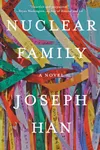Picture a Korean American storyteller weaving tales that dance between cultures, ghosts, and generational trauma—meet Joseph Han! With his debut novel, Nuclear Family, Han has burst onto the literary scene, blending magical realism, political satire, and heartfelt family dynamics to create a fresh voice in contemporary American literature.
Born in Seoul and raised in the vibrant, multicultural landscape of Hawaiʻi, Han’s stories carry the weight of history and the lightness of humor. His unique perspective as a Korean immigrant and his academic prowess as a PhD holder in English and Creative Writing from the University of Hawaiʻi at Mānoa shape his unforgettable narratives.
The Making of Joseph Han
Joseph Han’s journey began in Seoul, South Korea, before he moved to Oʻahu as a baby with his grandmother. Raised in a working-class Honolulu community, Han grew up surrounded by the rich tapestry of Hawaiian and Asian diaspora cultures. This melting pot of identities sparked his fascination with storytelling, particularly stories that bridge the past and present. After earning his PhD, Han honed his craft as a Kundiman Fellow, a prestigious recognition for Asian American writers, and took on an editorial role at Joyland Magazine’s West region, championing diverse voices.
His early writing, published in outlets like The New York Times Magazine and McSweeney’s Internet Tendency, showcased his knack for blending sharp wit with poignant cultural commentary. These experiences laid the groundwork for his bold debut, which would tackle the complexities of Korean American identity with a playful yet profound touch.
Joseph Han’s Unforgettable Stories
Han’s debut novel, Nuclear Family, published in 2022, is a genre-bending masterpiece that follows the Cho family, Korean American restaurant owners in Hawaiʻi. When their son Jacob, possessed by his grandfather’s ghost, attempts to cross the Korean Demilitarized Zone (DMZ), the family faces suspicion and dwindling business. Han’s magical realism shines as he explores the lingering trauma of the Korean War, the division of families, and the impact of U.S. imperialism, all wrapped in laugh-out-loud moments and mouthwatering food descriptions.
Beyond Nuclear Family, Han’s short story collection, Ten Thousand Years, further showcases his versatility, delving into themes of queerness, memory, and cultural dislocation with a poetic yet accessible style. His writing is marked by a surreal humor—think stoner comedy meets ancestral ghosts—and a deep empathy for characters grappling with identity and belonging. Critics have praised Han’s ability to juggle multiple perspectives and nonlinear timelines, creating immersive worlds that feel both intimate and expansive.
Han’s style is a vibrant mix of deadpan humor, cultural critique, and tender storytelling. Drawing inspiration from Korean traditions like jesa (ancestor offerings), he crafts narratives that honor the past while challenging modern borders—both literal, like the DMZ, and figurative, like those within families. His work resonates with readers seeking stories that reflect the complexities of the Asian American experience.
Why Joseph Han Matters
Joseph Han is redefining Asian American literature by centering the Korean diaspora and Hawaiian context in mainstream conversations. His bold exploration of U.S. militarism and its ripple effects on Korea and Hawaiʻi offers a fresh lens on global histories. As a 2022 National Book Foundation 5 Under 35 honoree, Han’s influence is growing, inspiring a new generation of writers to tackle identity and trauma with creativity and courage.
His work also fosters empathy, inviting readers to consider the unseen wounds of war and migration. By blending humor with heartache, Han makes these heavy topics accessible, ensuring his stories linger long after the final page. For readers and writers alike, Han is a beacon of innovative storytelling, proving that even the most specific cultural narratives can resonate universally.
- Born: Seoul, South Korea
- Key Work: Nuclear Family (2022)
- Awards: 2022 National Book Foundation 5 Under 35, 2023 APALA Adult Literature Honor
- Fun Fact: Han’s novel was longlisted for the 2023 PEN/Hemingway Award!
Snag Nuclear Family and dive into Joseph Han’s magical, hilarious, and heartfelt world of Korean American storytelling!
